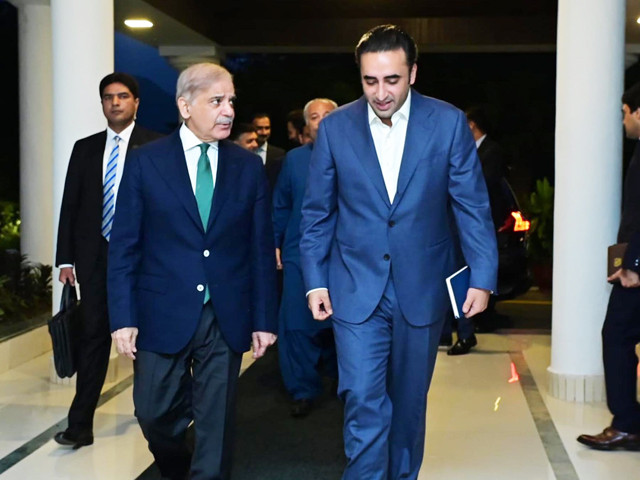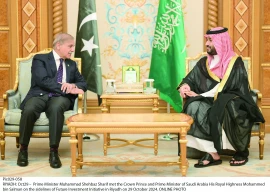
The Pakistan Peoples Party (PPP) and the Pakistan Muslim League-Nawaz (PML-N) have once again come face-to-face as the former accused the latter of creating political instability by taking decisions unilaterally.
The PPP demanded that Prime Minister Shehbaz Sharif take all stakeholders into confidence on key issues and immediately call a meeting of the Council of Common Interests (CCI). In addition, it conveyed to the PML-N that it has complaints regarding administrative matters in Punjab and Khyber-Pakhtunkhwa.
The two parties had faced a month-long standoff before they hammered out a power-sharing deal in Punjab in June and settled their difference over the national and Punjab budgets.
The PPP's criticism against the federal government and call for creating consensus among the provinces has been going on for the past several days with the latest statement coming from PPP spokesperson Shazia Marri, who voiced serious concerns over the federal government's proposal to construct six new canals from the Indus River.
The PPP spokesperson's remarks follow PPP Chairman Bilawal Bhutto Zardari's recent criticism of the government's handling of water resource issues and its neglect of the provincial concerns. Bilawal had publicly expressed frustration over the federal government's governance style and the PML-N's failure to respect coalition agreements.
Speaking to journalists last week, Bilawal had also accused the PML-N of sidelining the PPP on key decisions, including the controversial approval of a new canal project from the Indus Riveran issue the PPP claims was decided without consultation or achieving a consensus.
The apparent rift seems to have widened between the PML-N and its key ally as, reportedly, Bilawal embarked on a foreign tour without holding any meetings with Deputy Prime Minister Ishaq Dar, despite requests from Prime Minister Shehbaz Sharif to resolve the ongoing concerns.
Nevertheless, amid mounting grievances over what the PPP calls broken promises and unilateral decisions, Bilawal formed a committee to engage directly with the PML-N-led federal government with directions to the committee to report back to the party's Central Executive Committee (CEC) next month.
While the committee's formation signals a willingness to negotiate, the PPP leaders have made it clear that the party's patience was running thin. With the power to destabilise the coalition, the PPP has so far conveyed that it would continue working with the ruling PML-N, but given the current state of affairs, the PPP's next steps could have significant implications for the government's stability.
Against this backdrop, Marri emphasised on Thursday that the federal government must reconsider its canal project, warning that imposing unilateral decisions could deepen political instability and cause harm to an already fragile economy. She said that the concerns of Sindh and Balochistan regarding water resources were genuine and must be addressed, adding that any controversial project risks creating more rifts.
"If the concerns of Sindh and Balochistan are not addressed, the project will become controversial," Marri said, adding, "The PPP has complaints regarding administrative matters in Punjab and Khyber-Pakhtunkhwa."
She further said that the "federal government should avoid political instability; the country cannot afford instability at this time," adding, "unilateral decisions are not in the interest of the country in any way."
Highlighting Bilawal's recommendations, Marri urged the government to consult all stakeholders before initiating such ventures. Instead of controversial projects, she said, the federal government should prioritise dialogue and reach a consensus on agricultural plans for the provinces.
Marri also criticised the federal government for its failure to convene the CCI meeting for nine months, despite repeated requests from the Sindh chief minister. She called on PM Shehbaz to immediately convene the CCI to address provincial grievances and ensure inclusive decision-making.
She warned that disregarding the concerns of Sindh and Balochistan's farmers would render the canal project contentious. She also accused the federal government of attempting to "sabotage" Sindh's smart irrigation projects, which are designed to make efficient use of existing water resources.
The PPP believes in strengthening the agricultural economy and has always advocated for smart irrigation systems over flood irrigation, Marri said, reiterating Bilawal's stance. She said that the available water must be used effectively and no decision should be made at the expense of farmers' livelihoods in Sindh and Balochistan.
Calling for unity, Marri said that "unilateral decisions are not in the national interest. The federal government must avoid unpopular policies and work towards creating harmony among the provinces."



1719660634-1/BeFunky-collage-nicole-(1)1719660634-1-165x106.webp)

1732276540-0/kim-(10)1732276540-0-165x106.webp)


1724249382-0/Untitled-(640-x-480-px)1724249382-0-270x192.webp)


1732270499-0/Express-Tribune-(7)1732270499-0-270x192.webp)






COMMENTS
Comments are moderated and generally will be posted if they are on-topic and not abusive.
For more information, please see our Comments FAQ